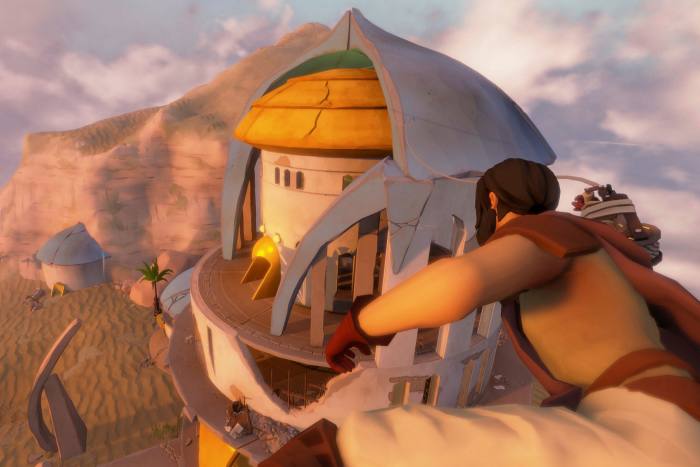Nostos, a video game where players roam a vast “open world”, was launched in December 2019 as a vindication of the cutting-edge technology developed by one of Britain’s brightest prospects: Improbable Worlds.
Improbable, co-founded by 32-year-old Herman Narula, the son of a billionaire construction magnate, hailed the game as a showcase of what developers could do with its software. But 15 months after launch, Nostos has been cancelled.
Nostos is the latest in a string of scrapped games built with Improbable’s SpatialOS software, raising questions about a technology that won a $500m investment from SoftBank in 2017, then the biggest ever investment into a UK start-up.
Improbable’s original goal was to help video games developers build vast online worlds where thousands of players could interact and see their actions persist after they logged off.
Narula also had grander ambitions to apply these huge simulations across government, academia and business that he said could make Improbable a global tech giant akin to Google or Alibaba. “We are building something like The Matrix,” he said in 2017.
Since the SoftBank round, Improbable has struggled to generate organic gaming revenues while losing half a dozen executives, according to their LinkedIn profiles. It has incurred losses of at least £144m, though the 800-employee start-up still has plenty of funding, according to its latest accounts.
Nostos, by the Chinese gaming giant NetEase — which bought $100m of Improbable shares at a $2bn valuation in 2018 including from shareholders such as Narula — had been the only SpatialOS game active this year.
After the Financial Times contacted NetEase querying the lack of recent updates for the game, the Chinese company announced this month that Nostos would be taken offline in June citing “changes in business development”.
Twenty games developers, former Improbable employees and other people with knowledge of the company pointed to the difficulties some developers have faced in using its technology.
Improbable’s efforts to secure a hit SpatialOS game have left Narula with an unimpressive record to-date, in the view of one industry veteran.
“He wants to change how games are made, but he hasn’t really made any games,” said Hilmar Veigar Petursson, chief executive of CCP Games, the maker of Eve Online, the space-based role-playing game.
Improbable said it had “invested and focused on growth” and that its forthcoming 2020 accounts would show “further growth”. It added that its vision of building virtual worlds “remains unchanged” and that today its technology was a “high-performance, scaling networking solution for a wide range of game types”.
“Hearsay or anecdotes about the alpha or pre-alpha state of Improbable’s first product are wildly out of date and do not reflect the reality of Improbable’s current business or its technology,” the company said.

Narula set out in 2012 to make it easier for small teams of developers to build massive and lucrative online games such as World of Warcraft, which have been the preserve of well-resourced studios.
Improbable’s solution was SpatialOS, which would distribute the huge workload needed to run vast worlds over servers in the cloud while scaling up and down the computing power when needed.
The idea quickly drew interest. “The technology I had always wanted and tried to make was finally here,” wrote Dean Hall, one of Improbable’s earliest collaborators, in 2015.
But building games with SpatialOS could be difficult and potentially expensive, according to eight developers who have used the technology.
Improbable had initially used in its software a programming language called Scala, which computer scientists admire for its precision but which games developers were not familiar with.
Implementing key features of SpatialOS could also require intensive labour, two developers said. The technology shares the task of running a virtual world between different computers. Ensuring a seamless experience as one computer handed off to another could be difficult, they said.
“When you start working [on the transitions], it’s really painful. Things just don’t work by themselves, you need to know exactly how to make everything work,” said Jacopo Pietro Gallelli, chief executive of Dynamight Studios, a Milan-based games developer.
“Once you master it, it’s a very powerful tool,” he added.
At the end of 2016, Improbable began phasing out Scala, ridding developers of a language they disliked while also requiring some to rewrite their games over time.
That prospect contributed to the decision in 2019 of Improbable’s first partner, Bossa Studios, to abandon the game it released in 2017, Worlds Adrift, said people familiar with the matter.
Bossa did not respond to a request for comment. Improbable has said it phased out Scala gradually and provided support to customers through the shift.

In early 2019, Improbable dropped a core selling point of SpatialOS. The company had advertised that its software pushed extra computing power into a game as needed. It removed the function, saying developers had found it difficult to use.
Gallelli, who intends to launch a SpatialOS game called Fractured next year, said scaling up SpatialOS for more players required him to save the game and reboot it with more computing power. “You can do it, but you have to do it yourself manually,” he said.
Other challenges developers cited were the hosting costs of SpatialOS, which Improbable says can be higher because of the extra computing power it uses to deliver better player experiences.
Cédric Tatangelo, chief executive of Ninpô, a Paris-based studio, in 2016 began using SpatialOS for a game called Vanishing Stars but estimated it would have cost $5 per player per month after launch. “There are not many games that can sell a monthly subscription,” he said.
Improbable has said it works with developers to optimise games before launch and is confident that Ninpô’s game would have run at far lower costs.
Another game hit by cost pressures was a project Improbable pursued with Hall, its early collaborator. Hall had paid $2m to Improbable in 2014 to fund the project, a game called Ion that was worked on by an in-house team of 20 developers at Improbable, according to people familiar with the matter.
But Ion was abandoned in late 2015 after Hall learnt, to his surprise, that the money had run out, according to one of the people. In 2017, the two sides agreed a settlement that included shares for Hall.
Hall corroborated those events in an email, adding that in his view: “The technology wasn’t scaling. It was expensive to host on the cloud, performance and bandwidth heavy. How the physics were handled on the server was quite ingenious; but it wasn’t scaling.”

Improbable has seen several top executives depart the company. Its first head of games, Nick Button-Brown, left in 2016 and is now a board member at a rival start-up, Coherence.
“I’ve always believed there are truly amazing and revolutionary online games to be made,” said Button-Brown, an Improbable shareholder. “That is why I joined Improbable originally and this is the reason I’m now helping Coherence to achieve this.”
Five executives hired in 2017 and 2018 have left the company and a new chief legal officer Improbable announced last April departed after six months, according to LinkedIn.
Improbable said its company-wide voluntary attrition was below the industry average and that some key members of its executive team had served for much of its nine-year history.
Over time, Improbable’s business has evolved. In 2019, it launched a push to release its own games, buying Midwinter Entertainment, which was developing a SpatialOS game, and setting up developer teams in London and Edmonton, Canada. It also bought a games consulting company and in 2020 it acquired a games-hosting business.
“Millions of users play games supported by Improbable’s multiplayer games technology and services, and some of the best-known studios in the world work with Improbable,” Improbable said.
It has also dropped early efforts to deploy its simulation technology in the corporate world and academia, focusing on government work. The start-up’s main revenue to-date has come from contracts with the UK military worth more than £25m since 2019.
“We are developing a software tool providing virtual training for our Armed Forces in simulated environments which constantly evolve with new data,” said the Ministry of Defence.
Improbable’s 2019 accounts showed more than £270m of cash, treasury notes and bonds. The company says its revenues are growing across all its business lines and that its losses to date are normal for a growth business.
Improbable intends to release later this year the game developed by Midwinter called Scavengers. It is not the massive world filled with thousands of players of which Narula had long dreamt. Rather, Scavengers is a battle-royale game, with up to 60 players in each match, fewer than the 100 accommodated by the hit game Fortnite.
Narula’s lofty ambition to build The Matrix appears to have given way to a more anodyne mission. “We provide better ways to make multiplayer games,” Improbable’s website says today.
“It’s a far cry from the big idea brand they once had,” said Mike Cook, a games developer and artificial intelligence researcher at Queen Mary University of London.
Follow on Twitter: @kadhim

